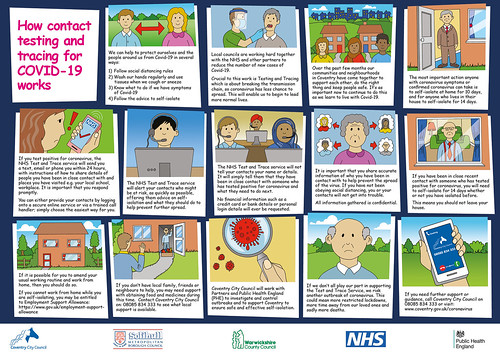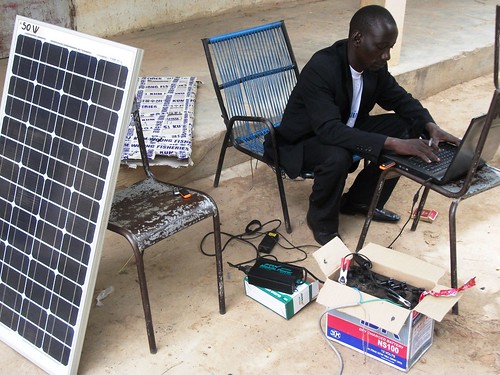
There is just one country where Apple will supply EarPods for free with an iPhone 12. CC-licensed photo by Pablo Asekas on Flickr.
You can sign up to receive each day’s Start Up post by email. You’ll need to click a confirmation link, so no spam.
A selection of 9 links for you. Well, you should have stayed on mute. I’m @charlesarthur on Twitter. Observations and links welcome.
•• Please note: The Overspill will be on holiday next week.
How Apple is organized for innovation • Harvard Business Review
Joel Polodny and Morten Hansen, from the Apple University group, explain – in a remarkable insight – how Apple is organised and functions:
»
Apple is not a company where general managers oversee managers; rather, it is a company where experts lead experts. The assumption is that it’s easier to train an expert to manage well than to train a manager to be an expert. At Apple, hardware experts manage hardware, software experts software, and so on. (Deviations from this principle are rare.) This approach cascades down all levels of the organization through areas of ever-increasing specialization. Apple’s leaders believe that world-class talent wants to work for and with other world-class talent in a specialty. It’s like joining a sports team where you get to learn from and play with the best.
Early on, Steve Jobs came to embrace the idea that managers at Apple should be experts in their area of management. In a 1984 interview he said, “We went through that stage in Apple where we went out and thought, Oh, we’re gonna be a big company, let’s hire professional management. We went out and hired a bunch of professional management. It didn’t work at all….They knew how to manage, but they didn’t know how to do anything. If you’re a great person, why do you want to work for somebody you can’t learn anything from? And you know what’s interesting? You know who the best managers are? They are the great individual contributors who never, ever want to be a manager but decide they have to be…because no one else is going to…do as good a job.”
…One principle that permeates Apple is “Leaders should know the details of their organization three levels down,” because that is essential for speedy and effective cross-functional decision-making at the highest levels. If managers attend a decision-making meeting without the details at their disposal, the decision must either be made without the details or postponed. Managers tell war stories about making presentations to senior leaders who drill down into cells on a spreadsheet, lines of code, or a test result on a product.
«
Some great anecdotes, especially about Steve Jobs culling general managers, and the development of the portrait camera function.
unique link to this extract
The next economic crisis: empty retail space • POLITICO
Katy O’Donnell:
»
Commercial real estate is in trouble, and turbulence in the $15 trillion market is threatening to bleed over into the broader financial system just as the U.S. struggles to emerge from a recession.
The longer the pandemic paralyzes hotels, retailers and office buildings, the more difficult it is for property owners to meet their mortgage payments — raising the specter of widespread downgrades, defaults and eventual foreclosures. As companies like J.C. Penney, Neiman Marcus and Pier 1 file for bankruptcy, retail properties are losing major tenants with no clear plan to replace them, while hotels are running below 50% occupancy.
Seven months into the crisis, the industry’s pleas for relief to Congress and the Federal Reserve have been in vain: Lawmakers are at odds over even the most basic details of an economic relief package for individuals, let alone businesses, and the Fed, leery of taking on more risk, is hoping the trillion-dollar market for securities backed by commercial mortgages will heal itself.
There’s also the fear that directing significant relief to the industry would be seen as a “handout to the president’s friends” since Donald Trump made his fortune in commercial real estate, said one lobbyist frustrated with the lack of traction the issue is getting with policymakers.
«
Second-order effects: they’re coming unless a lot of stuff gets sorted out quickly. Such as a stimulus package, or commercial rent forgiveness.
unique link to this extract
Huawei Mate 40 phones launch despite chip freeze • BBC News
Leo Kelion:
»
Huawei has unveiled its Mate 40 smartphones claiming they feature a more “sophisticated” processor than Apple’s forthcoming iPhones.
The component was made using the same “five nanometre” process as its US rival’s chip, but contains billions more transistors. As a result, the Chinese firm claims its phones are more powerful.
However, Huawei has had its supply of the chips cut off because of a US trade ban that came into effect in September.
That means that once its stockpile of the new Kirin 9000 processors runs out, it faces being unable to make more of the Mate 40 handsets in their current form.
At present, only Taiwan’s TSMC and South Korea’s Samsung have the expertise and equipment to manufacture 5nm chips, and both are forbidden to supply Huawei with them or any other semiconductor product whose creation involves “US technology and software”.
«
The analysts Canalys produced some figures on Friday which said that Huawei shipped 55.8m units in the second quarter of 2020 (yes, I know we’re in the fourth quarter now), and that its shipments outside China had reduced only from 21.4m in Q2 2019 to 15.6m in the same period in 2020. That’s not as big as I expected. But perhaps things have got worse in the past few months.
unique link to this extract
Doctors may have found secretive new organs in the center of your head • The New York Times
Katherine Wu:
»
After millenniums of careful slicing and dicing, it might seem as though scientists have figured out human anatomy. A few dozen organs, a couple of hundred bones and connective tissue to tie it all together.
But despite centuries of scrutiny, the body is still capable of surprising scientists.
A team of researchers in the Netherlands has discovered what may be a set of previously unidentified organs: a pair of large salivary glands, lurking in the nook where the nasal cavity meets the throat. If the findings are confirmed, this hidden wellspring of spit could mark the first identification of its kind in about three centuries.
Any modern anatomy book will show just three major types of salivary glands: one set near the ears, another below the jaw and another under the tongue. “Now, we think there is a fourth,” said Dr. Matthijs Valstar, a surgeon and researcher at the Netherlands Cancer Institute and an author on the study, published last month in the journal Radiotherapy and Oncology.
The study was small, and examined a limited patient population, said Dr. Valerie Fitzhugh, a pathologist at Rutgers University who wasn’t involved in the research. But “it seems like they may be onto something,” she said. “If it’s real, it could change the way we look at disease in this region.”
«
Oh 2020, you really do keep them coming. But this is important for things such as radiotherapy: you don’t want to hit them by accident. Which you would do if you don’t know they’re there.
unique link to this extract
End child food poverty – no child should be going hungry • UK Petitions
Marcus Rashford:
»
End child food poverty – no child should be going hungry
Government should support vulnerable children & #endchildfoodpoverty by implementing 3 recommendations from the National Food Strategy to expand access to Free School Meals, provide meals & activities during holidays to stop holiday hunger & increase the value of and expand the Healthy Start scheme
«
If you live in the UK, please sign this petition. Children aren’t responsible for their failings of their parents, but they need to eat like everyone else.
It’s amazing that it takes a Premier League footballer (who himself grew up going hungry, and so knows what these children are going through) to do this. But we are where we are, it seems
unique link to this extract
Facebook: Constitution before statutes • BuzzMachine
Jeff Jarvis:
»
What is missing, I have argued, is a Constitution for Facebook: a statement of why it exists, what kind of community it wants to serve, what it expects of its community, in short: a north star. That doesn’t exist.
But the Oversight Board might — whether it and Facebook know it or not — end up writing that Constitution, one in the English model, set by precedent, rather than the American model, set down in a document. That will be primarily in Facebook’s control. Though the Oversight Board can pose policy questions and make recommendations, it is limited by what cases come its way — from users and Facebook — and it does not set policy for the company; it only decides appeals and makes policy recommendations.
It’s up to Facebook to decide how it treats the larger policy questions raised by the Oversight Board and the cases. In reacting to recommendations, Facebook can begin to build a set of principles that in turn begin to define Facebook’s raison d’être, its higher goals, its north star, its Constitution. That’s what I’ve told people at Facebook I want to see happen.
The problem is, that’s not how Facebook or any of the technology companies think. Since, as Larry Lessig famously decreed, code is law, what the technologists want is rules — laws — to feed their code — their algorithms — to make consistent decisions at scale.
The core problem of the technology companies and their relationship with society today is that they do not test that code and the laws behind it against higher principles other than posters on the wall: “Don’t be evil.” “Move fast and break things.” Those do not make for a good Constitution.
«
Laudable aim, but translating a constitution of any sort into code is not an enterprise to be taken lightly. And Facebook already has so much code that its law is essentially set. Though it can be tweaked – witness Holocaust denial a week or so ago.
unique link to this extract
Republican lawmakers are furious after Twitter asks users to read stories before retweeting • The Verge
Adi Robertson:
»
Twitter announced last month that it would roll out the feature across its mobile apps, describing it as a way to “help promote informed discussion.” When you hit the retweet button on a link you haven’t visited, Twitter adds a label above the confirmation menu, warning that “headlines don’t tell the full story” and offering a chance to check the story out.
This is optional; you can ignore it and simply confirm the retweet if you want, and it doesn’t add any extra taps. But some conservative Twitter users expressed fury at the warning. Former PJ Media editor David Steinberg claimed that Twitter “placed a headline warning label” on a Wall Street Journal article about Republican congressional candidate Kimberly Klacik, saying the prompt “should disturb every American.” The label appears if you try to retweet many other WSJ articles on a variety of topics as well as stories from The Verge and other media outlets.
The claim was amplified by Republican members of Congress. Collins claimed that Twitter was “censoring” all tweets from Sean Hannity, citing labels on links to Hannity.com. The Twitter account for Judiciary Committee Republicans made a similar claim about a Hannity article, insinuating that Twitter had specifically added the warning to a story about allegedly leaked emails from Hunter Biden.
«
It’s amazing that elected representatives, who you’d hope would be smarter than average, wouldn’t even be able to read an onscreen instruction. The read-before-you-tweet scheme is a good one (though it doesn’t occur on third-party apps such as Tweetbot). Twitter is finally getting there.
unique link to this extract
French iPhone boxes come packed in an outer box with separate EarPods • MacRumors
Hartley Charlton:
»
After the news that France would be the only territory to continue to include EarPods with the iPhone, it seems that Apple is not packing the earbuds within the iPhone ‘s box (via iGeneration).
The French iPhone 12 and iPhone 12 Pro does not have a different retail box to accommodate EarPods, meaning that all iPhone boxes are consistent worldwide. Since the new iPhone boxes are slimmer without a tray for EarPods or a power adapter below the iPhone , in France the EarPods are in the bottom of a separate box that is large enough to also contain the standard iPhone ‘s box. The additional box appears to be much larger than the new, slimmed-down iPhone boxes.
Apple is continuing to include EarPods with iPhones in France due to legal obligations. French law demands that manufacturers provide a hands-free accessory with smartphones due to concerns about the effect of electromagnetic waves on the brains.
In addition to the iPhone 12 and 12 Pro, the iPhone 11, iPhone XR, and iPhone SE no longer include EarPods outside of France.
«
What a fabulous quiz question in a year or so. Something like “in which country was the iPhone 12 legally required to come with EarPods?” (Oh, those French and zee waves.)
unique link to this extract
Security researcher claims to have hacked Trump’s Twitter account • The Verge
Adi Robertson:
»
A security researcher claims he hacked President Donald Trump’s Twitter account earlier this month, guessing that his password was “maga2020!” and possibly posting a tweet where Trump appeared to take a satirical article seriously. Dutch newspaper de Volkskrant and magazine Vrij Nederland reported the news earlier today, citing screenshots and interviews with the researcher, Victor Gevers.
But when reached for comment, both Twitter and the White House vigorously denied the claim.
“We’ve seen no evidence to corroborate this claim, including from the article published in the Netherlands today,” a Twitter spokesperson told The Verge. “We proactively implemented account security measures for a designated group of high-profile, election-related Twitter accounts in the United States, including federal branches of government.”
«
Seems to have been a joke – a pretty poor one – by the researcher. You’d also hope that such an account would have two-factor turned on at the very least, and designated devices that can be used as a another layer of protection. Though of course this White House could deny anything, including where the sun will rise, and people would ignore it as probably false until checked.
unique link to this extract
Errata, corrigenda and ai no corrida: none notified










